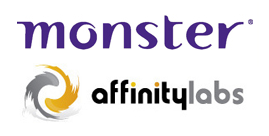
Job listings site Monster announced today that it has paid $61M for a young startup called Affinity Labs, which runs a set of websites for niche audiences such as police officers and nurses.
These sites, while only a few months old and attracting a total of only 800,000 unique visitors per month, are attractive to Monster because it can use them to target professionals who are in high demand by employers. The sites are essentially cookie-cutter information portals with social networking features that seek to attract members of particular demographics. Monster has already established a presence on each of the sites by deploying career search badges, like the one below, on their homepages.

A couple things are peculiar about this deal. First, Monster has paid a handsome sum of money for a company that offers neither a large user base nor coveted technological capabilities (as far as I can tell, these are simple CRUD websites built on Ruby on Rails). Second, Monster is retreading very familiar ground by purchasing several informational portals from the same guy, Christopher Michel, who sold them Military.com, an information portal for servicemen, in 2004 for $40M.
In fact, we’ve heard that this was not a coincidence but rather a repeat performance of sorts that has been planned all along. Affinity Labs was reportedly started in 2006 as a way for Michel to replicate and enhance his success with Military.com by selling a handful of similar sites to Monster within a relatively short period of time (an exit of one to two years). Monster even planned to invest in Affinity Labs before CEO Andrew J. McKelvey stepped down from his post during the company’s options backdating scandal in late 2006. Once McKelvey was gone, Monster shied away from investing and Affinity Labs raised its Series A with Mayfield instead. However, Affinity Labs continued to collaborate with the Military.com team within Monster to develop its handful of portals.
With today’s announcement, Michel’s plan of building a company with a specific Monster exit in mind has come to fruition. Whether Michel stays with the company will probably determine whether or not Monster has paid too much for the sprouting company, as he will be instrumental to their blossoming into established sites that can drive quality traffic to Monster.
The announcement highlights the fact you don’t need to build a revolutionary product if you have a well-defined buyer in mind from the start (and it doesn’t hurt have a little bit of history with that buyer as well). Affinity Labs didn’t build anything worth mention in the tech press, but it quickly executed on a project that it knew would be attractive for Monster given that company’s need for reaching professionals in demand. The deal also highlights the weaknesses and needs of a company like Monster, which has a harder time developing internally and will therefore gladly pay for several small startups rather than trying to deploy online destinations itself.
Update: This piece was not intended to suggest that there was any improper relationship between Michel and Monster that would lead to an inappropriately high purchase price. Michel’s previous sale to Monster, Military.com, is currently valued at hundreds of millions of dollars; therefore, it’s conceivable that one or more of Affinity Lab’s information portals could become just as successful and justify the $61M sales tag. This deal was also vetted by Goldman Sachs, which should allay concerns of impropriety due to Monster’s previous relationship with Michel. My skepticism over whether Monster paid too much stems from my cursory assessment of Affinity Lab’s properties, not a detailed look at the company’s revenues or even Michel’s standing relationship with Monster. I’ve been told that the architecture behind Affinity Labs’ sites is actually quite sophisticated, as it allows for the quick deployment of new properties.